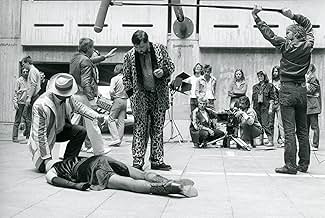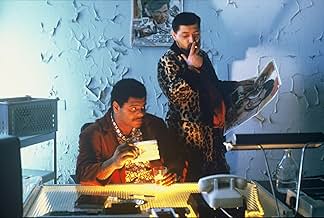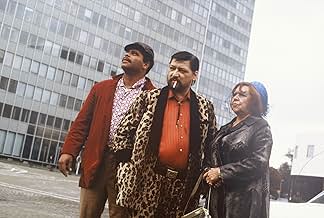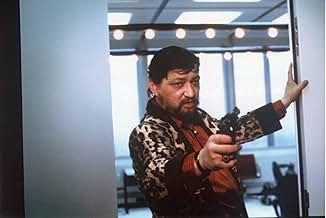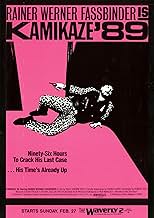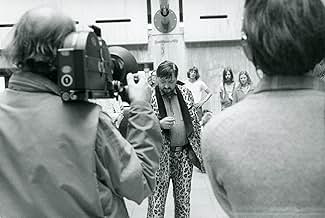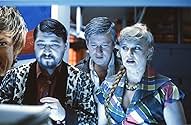In a totalitarian society of the future, in which the government controls all facets of the press, a homicide detective investigates a string of bombings, and finds out more than he bargaine... Read allIn a totalitarian society of the future, in which the government controls all facets of the press, a homicide detective investigates a string of bombings, and finds out more than he bargained for.In a totalitarian society of the future, in which the government controls all facets of the press, a homicide detective investigates a string of bombings, and finds out more than he bargained for.
- Director
- Writers
- Stars
- Awards
- 1 win & 3 nominations total
Andreas Mannkopff
- Wechselschichtregisseur
- (as Andreas Mannkopf)
Ute Koska
- Polizeiärztin
- (as Ute Fitz-Koska)
Hans-Eckart Eckhardt
- Polizist
- (as Hans-Eckhardt Eckhardt)
- Director
- Writers
- All cast & crew
- Production, box office & more at IMDbPro
Featured reviews
1989, to be precise. As imagined by Germans in 1982. Germany has become the world's foremost economic superpower, suicide is a thing of the past, and everyone does drugs, except there are no nasty side effects anymore. An overweight Rainer Werner Fassbinder mostly scowls his way through a quest to find out who's behind a series of murders that may be linked to a new resistance group. Or something like that. The plot seems secondary to the outrageous costumes (Fassbinder wears leopard tights throughout the whole film) and scenarios (like a police discotheque where you can shoot on firing ranges). It's an ugly film, and a stupid one, too, but it is perversely fascinating, and worth watching once, if only to impress your friends.
What kind of movie is 'Kamikaze 89'? Science fiction? Dystopia? It is definitely a special film from many points of view. The film is directed by Wolf Gremm (who is also a co-screenwriter), one of the well-known directors of the 'new German cinema' of the 1970s, author of films about inter-war Germany and of thrillers, all of them politically charged. The most important cinematographic personality that appears on the movie poster is however in this case not the director, but the actor who plays the main role. Rainer Werner Fassbinder was one of the leading figures in German cinema of that period. 'Kamikaze 89' was his last appearance on the screen, he died in June 1982, shortly after filming was completed.
The story takes place in 1989, 1989 as anticipated in 1982, in a future and totalitarian Germany. Fassbinder plays in this film the role of police lieutenant Janssen, called to investigate a suspected bombing, followed by a crime in the corporate headquarters that controls the morale of the population through television entertainment. His mission to solve the crime in the next four days is hampered by the fact that in the utopian society described in the film, officially, there are neither crimes nor suicides. The world of 'Kamikaze 89' is a rosy dystopia, in which the population is kept under control by Big Brother surveillance while the brains are washed and occupied by television shows such as the 'World Laughter Record'. The cynical, alcoholic and disillusioned Janssen may be the right man to solve this case, but as the circle of suspects gets closer to the company's bosses and that mysterious, secret '31st floor' in which the scenarios of future are written, the solving of the crime becomes a danger for the stability of the system.
The comparison between the future imagined in the literature and the films of anticipation and the reality of the anticipated period is, as always, fascinating. Although the interval is only seven years, the essential changes are those that take place in the social structure. Director Wolf Gremm did not have a budget that would allow him to create spectacular special effects, so he relied more on cultural extrapolations, some subtle, some less subtle. The Internet does not exist yet, and computers are as large as refrigerators and do not have graphical interfaces. Telephony and mobile videophones are controlled by the authorities. The population is fascinated by popular entertainment, and on this topic Gremm was able to correctly anticipate the devastating effect of 'reality show' genre, even if the phenomenon he described will occur one or two decades later than 1989. Electronic music and psychedelic clothing have become an aesthetic norm, and if we look at some societies in Asia today, we see that cultural conformism is not necessarily gray and militarized there. Leopard coats or jackets are police uniforms. The control of populations is facilitated by their addiction to escapist entertainment. The framing of the film in the patterns of the genre of punk anticipation is formally correct, but the stylistic decisions are motivated by a clear and not at all optimistic vision about the future.
Fassbinder's acting reminded me Orson Welles in the second part of his career. The director who gave the world in his youth the masterpiece 'Citizen Kane' constantly projected for grand plans, but after a few financial failures Hollywood no longer believed in him as a director. The result was that he appeared more as an actor, some of his roles were memorable as he succeeded to be both expressive and 'to melt' in his characters, modeling them according to his personality.
'Kamikaze 89' anticipates from many points of view the world 30 years later, with the domination of the big global corporations and the popular entertainment and communications as means of leveling the thinking of the population. 1989 however brought something else, the fall of the Iron Curtain followed by the reunification of Germany, historical events that Fassbinder prepared and anticipated artistically and ideologically in other films. Those were the milestones in the evolution towards the world of 'Kamikaze 89'.
The story takes place in 1989, 1989 as anticipated in 1982, in a future and totalitarian Germany. Fassbinder plays in this film the role of police lieutenant Janssen, called to investigate a suspected bombing, followed by a crime in the corporate headquarters that controls the morale of the population through television entertainment. His mission to solve the crime in the next four days is hampered by the fact that in the utopian society described in the film, officially, there are neither crimes nor suicides. The world of 'Kamikaze 89' is a rosy dystopia, in which the population is kept under control by Big Brother surveillance while the brains are washed and occupied by television shows such as the 'World Laughter Record'. The cynical, alcoholic and disillusioned Janssen may be the right man to solve this case, but as the circle of suspects gets closer to the company's bosses and that mysterious, secret '31st floor' in which the scenarios of future are written, the solving of the crime becomes a danger for the stability of the system.
The comparison between the future imagined in the literature and the films of anticipation and the reality of the anticipated period is, as always, fascinating. Although the interval is only seven years, the essential changes are those that take place in the social structure. Director Wolf Gremm did not have a budget that would allow him to create spectacular special effects, so he relied more on cultural extrapolations, some subtle, some less subtle. The Internet does not exist yet, and computers are as large as refrigerators and do not have graphical interfaces. Telephony and mobile videophones are controlled by the authorities. The population is fascinated by popular entertainment, and on this topic Gremm was able to correctly anticipate the devastating effect of 'reality show' genre, even if the phenomenon he described will occur one or two decades later than 1989. Electronic music and psychedelic clothing have become an aesthetic norm, and if we look at some societies in Asia today, we see that cultural conformism is not necessarily gray and militarized there. Leopard coats or jackets are police uniforms. The control of populations is facilitated by their addiction to escapist entertainment. The framing of the film in the patterns of the genre of punk anticipation is formally correct, but the stylistic decisions are motivated by a clear and not at all optimistic vision about the future.
Fassbinder's acting reminded me Orson Welles in the second part of his career. The director who gave the world in his youth the masterpiece 'Citizen Kane' constantly projected for grand plans, but after a few financial failures Hollywood no longer believed in him as a director. The result was that he appeared more as an actor, some of his roles were memorable as he succeeded to be both expressive and 'to melt' in his characters, modeling them according to his personality.
'Kamikaze 89' anticipates from many points of view the world 30 years later, with the domination of the big global corporations and the popular entertainment and communications as means of leveling the thinking of the population. 1989 however brought something else, the fall of the Iron Curtain followed by the reunification of Germany, historical events that Fassbinder prepared and anticipated artistically and ideologically in other films. Those were the milestones in the evolution towards the world of 'Kamikaze 89'.
First off, yes, you're right, this is a godawful movie.
Being a big Fassbinder fan, I rented this with excitement. Fassbinder stars, and he's always fun to watch. It's one of those punk-future-dystopian movies that popped out a bit in the early '80s, always good for some cult fun. It came out at the end of Fassbinder's career, and Fassbinder's whole 12 year filmmaking period only got better and better until his end.
So half way through I thought "what the hell happened? This movie is an atrocity exhibition."
Then I glanced at the cover, and in horror noticed this movie was NOT directed by Fassbinder. He just starred in it in a coked up narcisstic haze. I read he actually wore that leopard outfit he was giving in this movie on and off again in the last few weeks of his life.
Fassbinder was proud of this movie, somehow, and that gives it an odd charm. It's horrendous, but I haven't regretted watching it. There's a scene where Fassbinder climbs to a roof of a building, odd buzzing music is playing and the wind is blowing his hair and he has this perverse smile on his face as he gazes out across the city. There's also the ending where Fassbinder, bloated, in a robe, girates his body against a photo of an astronaut (I'm guessing this is Fassbinder's input, as the exact same ending pretty much is used in Stationmaster's Wife). These two scenes made it worthwhile. Otherwise, mark it off as an awful "Alphaville" rippoff.
Being a big Fassbinder fan, I rented this with excitement. Fassbinder stars, and he's always fun to watch. It's one of those punk-future-dystopian movies that popped out a bit in the early '80s, always good for some cult fun. It came out at the end of Fassbinder's career, and Fassbinder's whole 12 year filmmaking period only got better and better until his end.
So half way through I thought "what the hell happened? This movie is an atrocity exhibition."
Then I glanced at the cover, and in horror noticed this movie was NOT directed by Fassbinder. He just starred in it in a coked up narcisstic haze. I read he actually wore that leopard outfit he was giving in this movie on and off again in the last few weeks of his life.
Fassbinder was proud of this movie, somehow, and that gives it an odd charm. It's horrendous, but I haven't regretted watching it. There's a scene where Fassbinder climbs to a roof of a building, odd buzzing music is playing and the wind is blowing his hair and he has this perverse smile on his face as he gazes out across the city. There's also the ending where Fassbinder, bloated, in a robe, girates his body against a photo of an astronaut (I'm guessing this is Fassbinder's input, as the exact same ending pretty much is used in Stationmaster's Wife). These two scenes made it worthwhile. Otherwise, mark it off as an awful "Alphaville" rippoff.
A movie worth seeing for none other that three main reasons:
The absurdist exercise in retrofuturism.
The drunkenly charming performance of Fassbinder.
The colorful anarchism of a production design that rewrites all the rules of what was then known as cyberpunk.
The movie with his unbridled and convoluted plot owes way more to William Burroughs than William Gibson. The satire, in this unique cinematographic experience is more a direction chosen by director Wolf Gremm, than a clearly defined series of remarks that one can extract or decipher in the script. It is certainly witty and doesn't take itself seriously but you will hardly find any classically intended humour in the short and surreal lines of the actors.
However this is the true strength of the movie and what allows it, to stand the test of time.
I see in Kamikaze 1989 both echoes and premonitions of other much more famous films, all with considerably larger budgets. I recognize that this must be because all dystopic fiction commences from the two greats, Orwell's 1984 and Huxley's Brave New World. What subsequent creators have done is to put the pieces together in different orders, but the overarching totalitarian force governing the dystopic world, whether Blade Runner or The Hunger Games, Brazil, Robocop, or this obscure work not by but starring Rainer Werner Fassbinder, who in a bizarre reflection of a recurring trope of the film, himself became at the young age of 37, in the year 1982 (the year of this film's release), "ein unerwarteter Tod" = an unexpected death.
I am not sure whether this film would have been much better had it had the budget of Blade Runner or The Hunger Games, but I suspect that it would have been. On the other hand, we have grown accustomed to and now expect extremely fast-moving, often frenetic action in dystopic films. The pace here is incredibly slow, as though everyone is on some sort of downers (aside from the contestants in the Laughing Game, who are hooked up to IVs filled with hebephrenia-inducing drugs). Again: Huxley and Orwell already wrote it and others inspired by their works decided to dramatize the essence of dystopia.
Worth watching once, if only to see how later films may have been influenced by this creation.
I am not sure whether this film would have been much better had it had the budget of Blade Runner or The Hunger Games, but I suspect that it would have been. On the other hand, we have grown accustomed to and now expect extremely fast-moving, often frenetic action in dystopic films. The pace here is incredibly slow, as though everyone is on some sort of downers (aside from the contestants in the Laughing Game, who are hooked up to IVs filled with hebephrenia-inducing drugs). Again: Huxley and Orwell already wrote it and others inspired by their works decided to dramatize the essence of dystopia.
Worth watching once, if only to see how later films may have been influenced by this creation.
Did you know
- TriviaThis was the final acting role for Rainer Werner Fassbinder.
- GoofsThe movie claims 27 September 1989 to be a Monday, but that day was a Wednesday (The movie plays in 1989, as the title and a spoken intro make clear. The supposed explosion in the beginning of the movie was planned to take place on September 23, as Jansen points out. The chief of the police then urges Jansen to solve the case within for days, saying "until Monday afternoon," which would be September 27).
- Quotes
Policewoman: Suicide
Polizeileutnant Jansen: It would be the first in four years.
Policewoman: Sorry, I meant 'premature death.
- ConnectionsFeatured in Fassbinder (2015)
- How long is Kamikaze 89?Powered by Alexa
Details
Box office
- Gross US & Canada
- $22,440
- Opening weekend US & Canada
- $5,613
- Jun 5, 2016
- Gross worldwide
- $22,440
Contribute to this page
Suggest an edit or add missing content


